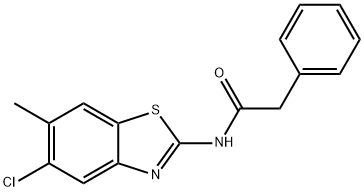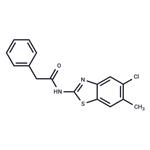Description
LH-846 (639052-78-1) is a potent and selective inhibitor of casein kinase (CK) 1δ. IC50s=0.29, 1.3 and 2.5 μM for δ, ε and α isoforms respectively with no inhibition of CK2. Inhibits CK1δ-mediated phosphorylation and degradation of PER1 protein and lengthens circadian period in U2OS cells.1
Uses
LH 846 modulates circadian rhythms in human cells by inhibiting CK1δ-dependent phosphorylation and subsequent degradation of PER1.
General Description
A cell-permeable benzothiazolo compound that acts a potent, selective, and reversible inhibitor of CKIδ (IC
50 = 290 nM). Exhibits much reduced potency towards CKIε and CKIα isoforms (IC
50 =1.3 and 2.5 μM, respectively). Does not affect the activity of CK2 or other kinases in a 59-protein kinase panel. Shown to block CKIδ-dependent period protein PER1 phosphorylation and diminish its proteasomal degradation in a dose-dependent manner. Also, shown to lengthen the circadian period in U2OS cells (10 h at 8 μM) without significantly affecting the amplitude of Per2-dLuc and Bmal1-dLuc rhythms.
Biochem/physiol Actions
LH846 is a potent and selective inhibitor of the known clock regulatory kinase Casein Kinase CK1δ, with an IC50 of 290 nm, compared to an IC50 of 2.5 μm for CKIα , 1.3 μm for CKIε, and minimal effect on CK2 and 50 other kinases tested. Circadian rhythym has been studied for a long time for things such as jet lag rhythym related disorders, but more recently it has beencome apparent that clock dysfunction can contribute to a variety of pathologies including circadian sleep disorders, cardiovascular disease, cancer, and metabolic disease, so studies of clock regulating enzymes have increased. LH846 increased circadian period by 10 hours in human U2OS cells.
References
1) Lee et al. (2011), A small molecule modulates circadian rhythms through phosphorylation of the period protein; Agnew Chem. Int. ed. Engl., 50 10608



